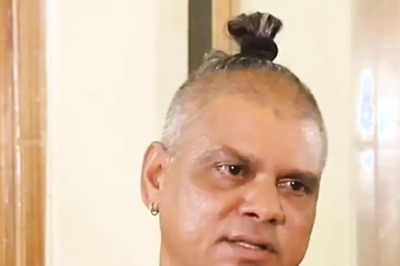
views
New Delhi: Just after a dozen Indian Air Force Mirage-2000 jets crossed the Line of Control (LoC) early on Tuesday morning and destroyed terror camps of Pakistan-based Jaish-e-Mohammed in Balakot, former Deputy National Security Advisor Leela K Ponappa said the strike was an act of “self-defence” and should have been carried out after the 26/11 Mumbai terror attacks.
The air strike, which has been dubbed surgical strikes 2.0, comes two weeks after a terror attack on CRPF soldiers in Jammu and Kashmir’s Pulwama.
Pakistan Prime Minister Imran Khan on Tuesday directed the nation’s armed forces and people to remain prepared “for all eventualities” after holding an emergency meeting of the National Security Council, hours after the IAF warplanes conducted the strike deep in Pakistani territory.
Ponappa, who was the Deputy National Security Advisor and Secretary, National Security Council Secretariat from 2007-2009, told News18 that the strike might have been a favour to Pakistanis too as it got them rid of terrorists.
“There has been a security problem that India has been facing from Pakistan since many years. This attack should have been carried out 11 years ago during the Mumbai attacks. But certain step has been taken,” said the former diplomat who added, “If such a strike had happened after Mumbai attacks, then it would have sent a message but it did not happen for whatever reasons. After Mumbai attack, there has been Pathankot, Uri, Gurdaspur; so now we are very clear in signals sent and no mixed signals for Pakistan or to Pakistan.”
India carried out "non-military, preemptive air strikes" across the Line of Control in a pre-dawn operation targeting the terror group Jaish-e-Mohammed, which was planning more attacks in the country after Pulwama, the government said.
To this, Ponappa said the move was not an act of war as no military establishment was damaged.
“We have for many years been calling for the dismantling of the terrorist infrastructure in Pakistan. The Foreign Secretary has stated that there has been credible evidence which suggested gathering of personnel was seen to organise further terrorist attacks in India and hence the target was non-military,” Ponappa told News18.
However, she added that such attacks also happen because Pakistan is a “hub of terrorism”. “They are a hub of terrorism not only for India but also many other places as terrorism is a part of their state policy. Their state is controlled by the Pakistan army and they don't distinguish between the ISI and Pakistan. It’s now time for India to decide when enough is enough,” said Ponappa.
Though Pakistan claimed that no damage was caused by the action and India had to rush after being chased by its air force, Ponappa said what the strike might have really done is hurt the neighbouring country's pride.
“Pakistan will consider their options. Elements within Pakistan establishment will also have their own points of view. But their pride will be affected since they have to get over what happened in 1971 as it governs a lot things they do. Also, we should not look for logic from Pakistan,” said Ponappa, adding, “This is not going to be a one-off act as it will be followed by intense diplomatic activity. Now we have to be on our guard.”
Ponappa also said the strike was against terrorism and if Pakistan defended it, it would send out a “clear message”.


















Comments
0 comment